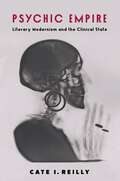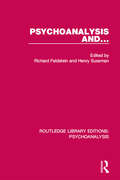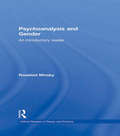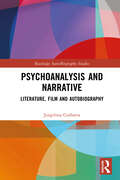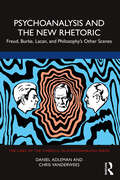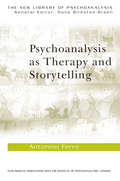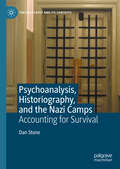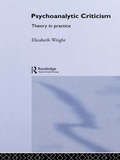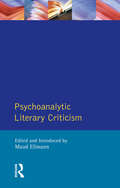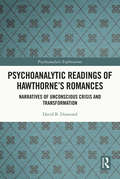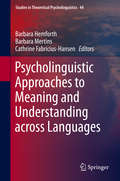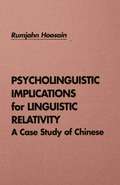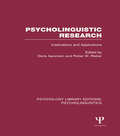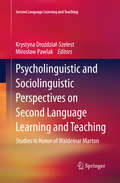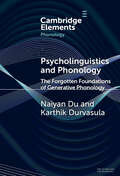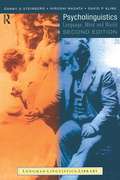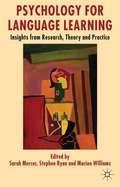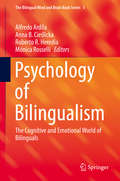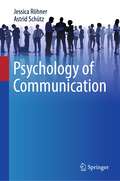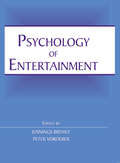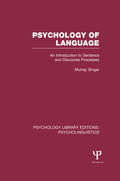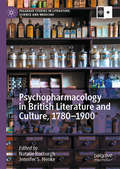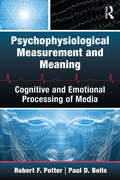- Table View
- List View
Psychic Empire: Literary Modernism and the Clinical State (Modernist Latitudes)
by Cate I. ReillyIn nineteenth-century imperial Germany and the Austro-Hungarian Empire, new scientific fields like psychophysics, empirical psychology, clinical psychiatry, and neuroanatomy transformed the understanding of mental life in ways long seen as influencing modernism. Turning to the history of psychiatric classification for mental illnesses, Cate I. Reilly argues that modernist texts can be understood as critically responding to objective scientific models of the psyche, not simply illustrating their findings. Modernist works written in industrializing Central and Eastern Europe historicize the representation of consciousness as a quantifiable phenomenon within techno-scientific modernity.Looking beyond modernism’s well-studied relationship to psychoanalysis, this book tells the story of the non-Freudian vocabulary for mental illnesses that forms the precursor to today’s Diagnostic and Statistical Manual of Mental Disorders. Developed by the German psychiatrist Emil Kraepelin in the 1890s, this psychiatric taxonomy grew from the claim that invisible mental illnesses were analogous to physical phenomena in the natural world. Reilly explores how figures such as Georg Büchner, Ernst Toller, Daniel Paul Schreber, Nikolai Evreinov, Vsevolod Ivanov, and Santiago Ramón y Cajal understood the legal and political consequences of representing mental life in physical terms. Working across literary studies, the history of science, psychoanalytic criticism, critical theory, and political philosophy, Psychic Empire is an original account of modernism that shows the link between nineteenth-century scientific research on the mental health of national populations and twenty-first-century globalized, neuroscientific accounts of psychopathology and sanity.
Psychoanalysis and ...: The Sublime And The Grandiose In Literature, Psychopathology, And Culture (Routledge Library Editions: Psychoanalysis)
by Henry Sussman Richard FeldsteinOriginally published in 1990, Psychoanalysis and… brings together essays by critics whose work demonstrates the lively interpenetration of psychoanalysis and other disciplines. Andrew Ross investigates psychoanalysis and Marxist thought; Joel Fineman reads the "sound of O" in Othello; Jane Gallop asks "Why does Freud giggle when the women leave the room?"; and Ellie Ragland-Sullivan examines Lacan’s seminars on James Joyce. This stimulating collection of work should still be required reading, especially for students of literature. But Psychoanalysis and… demonstrates that psychoanalysis – and theoretical criticism, and feminism, and Lacanian theory, and semiotics, and Marxism, and deconstruction, and literary criticism – was, at the time, a rich and expanding terrain.
Psychoanalysis and Gender: An Introductory Reader (Critical Readers in Theory and Practice)
by Rosalind MinskyWhat is object-relations theory and what does it have to do with literary studies? How can Freud's phallocentric theories be applied by feminist critics? In Psychoanalysis and Gender: An Introductory Reader Rosalind Minsky answers these questions and more, offering students a clear, straightforward overview without ever losing them in jargon.In the first section Minsky outlines the fundamentals of the theory, introducing the key thinkers and providing clear commentary. In the second section, the theory is demonstrated by an anthology of seminal essays which includes:* Feminity by Sigmund Freud* Envy and Gratitude by Melanie Klein* An extract from Transitional Objects and Transitional Phenomena by Donald Winnicot* The Meaning of the Phallus by Jacques Lacan* An extract from Women's Time by Julia Kristeva* An extract from Speculum of the Other Woman by Luce Irigaray
Psychoanalysis and Narrative: Literature, Film and Autobiography (ISSN)
by Jorgelina CorbattaPsychoanalysis and Narrative analyzes narrative in literary fiction, film, and autobiography through different psychoanalytic lenses including gender and socio-cultural perspectives. This book aims to demonstrate how fictionists and film makers have intuitively developed – through their own creativity – many of the psychoanalytic discoveries about the human mind. Subverting the usual direction of “applied psychoanalysis,” the book goes from creativity to psychoanalysis, and focuses on four internationally known Argentine writers: Jorge Luis Borges, Julio Cortázar, Manuel Puig, and Luisa Valenzuela; two Argentine women filmmakers, Lucrecia Martel and Lucía Puenzo; and French essayist and writer Serge Doubrovsky. This volume will be of interest to students and academics interested in autobiography and autofiction.
Psychoanalysis and the New Rhetoric: Freud, Burke, Lacan, and Philosophy's Other Scenes (The\lines Of The Symbolic In Psychoanalysis Ser.)
by Chris Vanderwees Daniel AdlemanPsychoanalysis and the New Rhetoric: Freud, Burke, Lacan, and Philosophy's Other Scenes is an innovative work that places the fields of psychoanalysis and rhetoric in dynamic resonance with one another. The book operates according to a compelling interdisciplinary conceit: Adleman provocatively explores the psychoanalytic aspects of rhetoric and Vanderwees probes the rhetorical dimensions of psychoanalytic practice. This thoroughly researched text takes a closer look at the "missed encounter" between rhetoric and psychoanalysis. The first section of the book explores the massive, but underappreciated, influence of Freudian psychoanalysis on Kenneth Burke’s "new rhetoric." The book’s second section undertakes sustained investigations into the rhetorical dimensions of psychoanalytic concepts such as transference, free association, and listening. Psychoanalysis and the New Rhetoric then culminates in a more comprehensive discussion of Lacanian psychoanalysis in the context of Kenneth Burke’s new rhetoric. The book therefore serves as an invaluable aperture to the fields of psychoanalysis and rhetoric, including their much overlooked disciplinary entanglement. Psychoanalysis and the New Rhetoric will be of great interest to scholars of psychoanalytic studies, rhetoric, language studies, semiotics, media studies, and communication studies.
Psychoanalysis as Therapy and Storytelling (The New Library of Psychoanalysis)
by Antonino FerroIs psychoanalysis a type of literature? Can telling 'stories' help us to get at the truth? Psychoanalysis as Therapy and Storytelling examines psychoanalysis from two perspectives - as a cure for psychic suffering, and as a series of stories told between patient and analyst. Antonino Ferro uses numerous clinical examples to investigate how narration and interpretation are interconnected in the analytic session. He draws on and develops Bion's theories to present a novel perspective on subjects such as: psychoanalysis as a particular form of literature sexuality as a narrative genre or dialect in the analyst's consulting room delusion and hallucination acting out, the countertransference and the transgenerational field play: characters, narrations and interpretations. Psychoanalytic clinicians and theoreticians alike will find the innovative approach to the analytic session described here of great interest. Winner of the 2007 Sigourney Award.
Psychoanalysis, Historiography, and the Nazi Camps: Accounting for Survival (The Holocaust and its Contexts)
by Dan StoneIn the postwar years, Dutch survivors Eddy de Wind, Louis Micheels, and Elie A. Cohen, who went on to become practicing psychoanalysts, penned accounts of their survival of the Nazi camps. Their sober assessments contrast sharply with those by Bruno Bettelheim and Viktor Frankl, which emphasized decisiveness, 'positive thinking', and resistance, missing the fact that many Holocaust victims with those characteristics or other qualities did not survive. De Wind’s, Micheels’ and Cohen’s accounts are more sober, (self-)critical, and shaped by analytical practice. By analyzing them anew and comparing them with accounts by female doctors who survived Block 10 in Auschwitz, this book argues that their theories of survival accord with contemporary sensibilities in psychoanalysis and Holocaust historiography. Psychoanalytic concepts have changed over time in response to greater understanding of the Holocaust and recent Holocaust historiography makes us more receptive to insights that were unfashionable in the first postwar decades.
Psychoanalytic Criticism: A Reappraisal (New Accents Ser.)
by Elizabeth WrightFirst published in 2002. Routledge is an imprint of Taylor & Francis, an informa company.
Psychoanalytic Literary Criticism (Longman Critical Readers)
by Maud EllmannThis collection of essays provides students of literary critical theory with an introduction to Freudian methods of interpretation, and shows how those methods have been transformed by recent developments in French psychoanalysis, particularly by the influence of Jacques Lacan. It explains how classical Freudian criticism tended to focus on the thematic content of the literary text, whereas Lacanian criticism focuses on its linguistic structure, redirecting the reader to the words themselves. Concepts and methods are defined by tracing the role played by the drama of Oedipus in the development of psychoanalytic theory and criticism. The essays cover a wide generic scope and are divided into three parts: drama, narrative and poetry. Each is accompanied by explanatory headnotes giving clear definitions of complex terms.
Psychoanalytic Readings of Hawthorne’s Romances: Narratives of Unconscious Crisis and Transformation (Psychoanalytic Explorations)
by David B. DiamondOffering innovative, psychoanalytic readings of Nathaniel Hawthorne’s four romances, this volume systematically applies Freudian theory to present significant new insights into the psychology of Hawthorne’s characters and their fates. By critically examining scenes in which the protagonists confront past traumas, Diamond underscores the transformative potential which Hawthorne attributes to encounters with the unconscious. Psychoanalytic narrative technique is employed to interpret the psychogical crises, all hidden by Hawthorne in narrative gaps, in The Scarlet Letter, The House of the Seven Gables, The Blithedale Romance, and The Marble Faun. The protagonists' transformations that are illuminated are crucial to an understanding of the trajectory and resolution of the romances. The text will benefit both academic and non-academic readers who seek a deeper understanding of the psychology of Hawthorne's romances. It will be of particular interest to educators and researchers of applied psychoanalysis and psychoanalytic technique. Since its conclusions challenge many currently held critical views, this volume is especially relevant to scholars of Hawthorne studies, interdisciplinary literary studies, and 19th century American literature.
Psycholinguistic Approaches to Meaning and Understanding across Languages
by Barbara Hemforth Barbara Mertins Cathrine Fabricius-HansenReports on joint work by researchers from different theoretical and linguistic backgrounds offer new insights on the interaction of linguistic code and context in language production and comprehension. This volume takes a genuinely cross-linguistic approach integrating theoretically well-founded contrastive descriptions with thorough empirical investigations. Authors answer questions on the topic of how we 'encode' complex thoughts into linguistic signals and how we interpret such signals in appropriate ways Chapters combine on- and off-line empirical methods varying from large-scale corpus analyses over acceptability judgements, sentence completion studies and reading time experiments. The authors shed new light on the central questions related to our everyday use of language, especially the problem of how we construe meaning in and through language in general as well as through the means provided by particular languages.
Psycholinguistic Implications for Linguistic Relativity: A Case Study of Chinese
by Rumjahn HoosainRather than offering variations in "world view" as evidence for linguistic relativity, this book views language related differences in terms of the facility with which information is processed. Distinctive perceptual, memory, and neurolinguistic aspects of the Chinese language are discussed, as is the cognitive style of the Chinese people. Chinese orthography and other features of morphology and syntax are examined in relation to both bottom-up and top-down cognitive processes. While providing an extensive review of the experimental literature published in English on the Chinese language, this volume also offers a significant sample of the literature originally published in Chinese.
Psycholinguistic Research: Implications and Applications (Psychology Library Editions: Psycholinguistics)
by Robert W. Rieber Doris AaronsonOriginally published in 1979, this book represents an effort to bring together the two disciplines at the core of psycholinguistics, psychology and linguistics. It discusses a broad variety of theoretical approaches to psycholinguistics as well as covering a wide range of topics. At the time the book had four goals: to discuss many of the important contemporary issues in psycholinguistics; to explore the different views on major theoretical controversies; to provide an analysis of background literature as a framework in which to evaluate the issues and controversies; and to describe interesting high-quality research currently being done by the authors and some of their colleagues. Today it can be read and enjoyed in its historical context, with many of the chapters still relevant in psycholinguistic research today.
Psycholinguistic and Sociolinguistic Perspectives on Second Language Learning and Teaching
by Mirosław Pawlak Krystyna Drozdzial-SzelestThe volume provides a state-of-the-art overview of key issues in second language learning and teaching, adopting as a point of reference both psycholinguistic and sociolinguistic perspectives. The papers included in the collection, which have been contributed by leading specialists in the field from Poland and abroad, touch upon important theoretical issues, report latest research findings and offer guidelines for classroom practice. The range of topics covered and the inclusion of concrete pedagogic proposals ensures that the book will be of interest to a wide audience, not only SLA specialists, but also methodologists, material designers, undergraduate and graduate students, and practitioners
Psycholinguistics and Phonology: The Forgotten Foundations of Generative Phonology (Elements in Phonology)
by Naiyan Du Karthik DurvasulaResearch over the last few decades has consistently questioned the sufficiency of abstract/ discrete phonological representations based on putative misalignments between predictions from such representations and observed experimental results. The authors first suggest that many of the arguments ride on misunderstandings of the original claims from generative phonology, and that the typical evidence furnished is consistent with those claims. They then focus in on the phenomenon of incomplete neutralisation and show that it is consistent with the classic generative phonology view. The authors further point out that extant accounts of the phenomenon do not achieve important desiderata and typically do not provide an explanation for either the phenomenon itself, or why there are actually at least two different kinds of incomplete neutralisation that don't stem from task confounds. Finally, they present new experimental data and explain that the phenomenon is an outcome of planning using abstract/discrete phonological knowledge.
Psycholinguistics: Central Topics
by Alan GarnhamFrom the author: This book reflects my beliefs about how psycholinguistics, and cognitive psychology in general, should be taught. Since psycholinguistics is a scientific discipline, the book discusses theories about the central cognitive aspects of language understanding, rather than presenting a morass of unstructured facts on a series of loosely connected topics. It also attempts to reflect the emergence of cognitive science, an interdisciplinary approach to the study of language and other cognitive processes. It describes not only psychological studies, but also ideas from linguistics, artificial intelligence, the philosophy of language and formal logic. There is no pretence that the discussion is exhaustive.
Psycholinguistics: Language, Mind and World (Longman Linguistics Library)
by Danny D. Steinberg Hiroshi Nagata David P. AlineHow do we learn to produce and comprehend speech? How does language relate to thought?This second edition of the successful text Psycholinguistics- Language, Mind and World considers the psychology of language as it relates to learning, mind and brain as well as various aspects of society and culture. Current issues and research topics are presented in an in-depth manner, although little or no specific knowledge of any topic is presupposed.The book is divided into four main parts: First Language Learning Second Language Learning Language, Mind and Brain Mental Grammar and Language Processing These four sections include chapters covering areas such as- deaf language education, first language acquisition and first language reading, second language acquisition, language teaching and the problems of bilingualism.Updated throughout, this new edition also considers and proposes new theories in psycholinguistics and linguistics, and introduces a new theory of grammar, Natural Grammar, which is the only current grammar that is based on the primacy of the psycholinguistic process of speech comprehension, derives speech production from that process. Written in an accessible and fluent style, Psycholinguistics- Language, Mind and World will be of interest to students, lecturers and researchers from linguistics, psychology, philosophy and second language teaching.
Psychology and History
by Cristian Tileagă Jovan ByfordAs disciplines, psychology and history share a primary concern with the human condition. Yet historically, the relationship between the two fields has been uneasy, marked by a long-standing climate of mutual suspicion. This book engages with the history of this relationship and possibilities for its future intellectual and empirical development. Bringing together internationally renowned psychologists and historians, it explores the ways in which the two disciplines could benefit from a closer dialogue. Thirteen chapters span a broad range of topics, including social memory, prejudice, stereotyping, affect and emotion, cognition, personality, gender and the self. Contributors draw on examples from different cultural contexts - from eighteenth-century Britain, to apartheid South Africa, to conflict-torn Yugoslavia - to offer fresh impetus to interdisciplinary scholarship. Generating new ideas, research questions and problems, this book encourages researchers to engage in genuine dialogue and place their own explorations in new intellectual contexts.
Psychology for Language Learning
by Marion Williams Sarah Mercer Stephen RyanOffering a timely snapshot of current theory and research in the field of psychology in foreign language learning, this book is accessible to both specialists and non-specialists. Each chapter focuses on a different psychological construct and provides an overview of current thinking in the area drawing on insights from educational psychology.
Psychology of Bilingualism
by Roberto R. Heredia Anna B. Cieślicka Alfredo Ardila Mónica RoselliThe aim of this volume is to integrate the current literature about the psychological dimensions of bilingualism: that is, to analyze psychological, subjective, and internal perspectives on bilingualism. What is the internal world of bilinguals like? How do they perceive the world and how do they think? What are the advantages and disadvantages of being bilingual? How does bilingualism interact with personality? In what way does being bilingual impact the aging mind? Renowned and emerging scholars alike explore these questions in the collected chapters. The organization of the book features four main component parts: (1) the inner cognitive world of the bilingual mind (2) bilingual language representation, and (3) bilingualism across the lifespan, and 4) bilingual cognitive and personality dimensions. Taken collectively, the included chapters provide a multidimensional and up-to-date perspective on bilingual studies, specifically concentrating on the cognitive and emotional dimensions of the individual. Chapter topics include: Conceptual Metaphor Theory Bilingual Figurative Language Processing Aging in Bilinguals Psychopathology in Bilinguals Personality Traits in Bilinguals Addressing the growing demand for bilingual research, this collection provides a timely and much needed perspective on the bilingual as an individual, exploring his/her internal world and a range of phenomena, including emotional word processing, personality traits, language effects on the mind, and cognitive effects of bilingualism. As such, it will appeal to a wide range of readers across various intellectual and professional arenas, including cognitive psychologists, personality psychologists, psycholinguists, educational psychologists and second language teachers, among others.
Psychology of Communication
by Jessica Röhner Astrid SchützThis successful textbook on the psychology of communication explains - here in English for the first time - how human communication works in a very understandable way. It begins with the explanation of central terms and the explanation of known communication models (e.g. the models according to Schulz von Thun, Watzlawick, Hargie and colleagues), then describes means of non-verbal and verbal communication and ends with a clear and structured summary of communication forms. Concrete fields of application, stumbling blocks (e.g. intercultural differences in communication), practical examples and digressions in the book round off what has been read and consolidate what has been learned. In addition, free learning materials are available on the Internet with which readers can test their knowledge acquisition.
Psychology of Entertainment: The Psychology Of Its Appeal (Routledge Communication Series)
by Jennings Bryant Peter VordererAs entertainment becomes a trillion-dollar-a-year industry worldwide, as our modern era increasingly lives up to its label of the "entertainment age," and as economists begin to recognize that entertainment has become the driving force of the new world economy, it is safe to say that scholars are beginning to take entertainment seriously. The scholarly spin on entertainment has been manifested in traditional ways, as well as innovative ones. Representing the current state of theory and research, Psychology of Entertainment promises to be the most comprehensive and up-to-date volume on entertainment. It serves to define the new area of study and provides a theoretical spin for future work in the area.Divided into three basic parts, this book:*addresses the fundamental mechanisms and processes involved in orienting to and selecting entertainment fare, as well as receiving and processing it;*explores the mechanisms and processes by which we are entertained by the media messages we select and receive; and*provides an opportunity for the application of well-established as well as emerging psychological and psychobiological theories to be applied to the study of entertainment in ways that seldom have been utilized previously.Psychology of Entertainment will appeal to scholars, researchers, and graduate students in media studies and mass communication, psychology, marketing, and other areas contributing to the entertainment studies area.
Psychology of Language: An Introduction to Sentence and Discourse Processes (Psychology Library Editions: Psycholinguistics)
by Murray SingerOriginally published in 1990, this comprehensive volume addresses the central issues of sentence and discourse processes, with particular emphasis placed on reading and listening comprehension. The text material is accessible to both upper-level undergraduate and graduate students and informative for professionals and educators. In this regard, this uncommon volume identifies the logic of both the specific experimental manipulations that are described, and the more general on-line and memory measures frequently invoked. The principles presented in the text are supported by hundreds of numbered and unnumbered examples, and by precise tables and figures.
Psychopharmacology in British Literature and Culture, 1780–1900 (Palgrave Studies in Literature, Science and Medicine)
by Natalie Roxburgh Jennifer S. HenkeThis collection of essays examines the way psychoactive substances are described and discussed within late eighteenth- and nineteenth-century British literary and cultural texts. Covering several genres, such as novels, poetry, autobiography and non-fiction, individual essays provide insights on eighteenth- and nineteenth-century understandings of drug effects of opium, alcohol and many other plant-based substances. Contributors consider both contemporary and recent medical knowledge in order to contextualise and illuminate understandings of how drugs were utilised as stimulants, as relaxants, for pleasure, as pain relievers and for other purposes. Chapters also examine the novelty of experimentations of drugs in conversation with the way literary texts incorporate them, highlighting the importance of literary and cultural texts for addressing ethical questions.
Psychophysiological Measurement and Meaning: Cognitive and Emotional Processing of Media (Routledge Communication Series)
by Robert F. Potter Paul BollsThis research volume serves as a comprehensive resource for psychophysiological research on media responses. It addresses the theoretical underpinnings, methodological techniques, and most recent research in this area. It goes beyond current volumes by placing the research techniques within a context of communication processes and effects as a field, and demonstrating how the real-time measurement of physiological responses enhances and complements more traditional measures of psychological effects from media. This volume introduces readers to the theoretical assumptions of psychophysiology as well as the operational details of collecting psychophysiological data. In addition to discussing specific measures, it includes brief reviews of recent experiments that have used psychophysiological measures to study how the brain processes media. It will serve as a valuable reference for media researchers utilizing these methodologies, or for other researchers needing to understand the theories, history, and methods of psychophysiological research.
